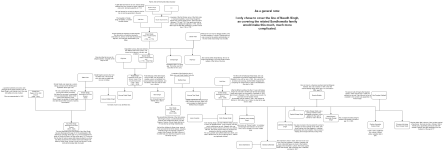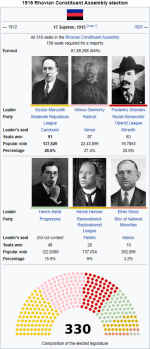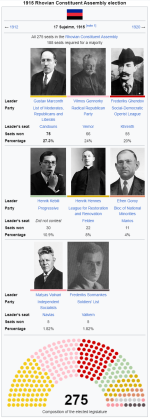Radac
Too young, too simple, sometimes naïve
- Location
- Pentapotamia-in-Exile
- Pronouns
- he/him
Sun Fo (Kuomintang) (1948 - 1964)
Chang Chun-Mai (Kuomintang) (1964)
Yeh Kung-Chao (Kuomintang) (1964 - 1966)
Chang Chun-Mai (Kuomintang) (1966)
Sun Sui-Ying (Kuomintang) (1966 - 1977)
Kung Ling-kan (Minchongtang) (1977 - 1979)
Hu Yao-Pang (Minchongtang) (1979 - 1980)
Sun Sui-Ying (Kuomintang) (1980 - 1984)
Sun Te-Chieh (Kuomintang) (1984 - 1989)
Hu Chee-Lee (Minchongtang) (1989 - 1990)
Yao Wen-Yuang (Minchu Minchongtang) (1990 - 1991)
Chao Tzu-yang (Kuomintang) (1991 - 1996)
Chao Chun-Hsiao (Ch'ingnien-Tang) (1996)
Pao Tung (Minchongtang) (1996 - 1997)
Yan Ming-Foo (Minchongtang) (1997 - 1998)
Chao Chun-Hsiao (Ch'ingnien-Tang) (1998 - 2004)
Sung Ch'u-yu (Kuomintang) (2004 - 2014)
Li Hung-chih (Ch'ingnien-Tang) (2014 - present)
So don't take this one too seriously. It was just a silly thought experiment I had in mind where China and India switched places. India ITTL would probably be some kind of weird mixture of KMT China and modern-day China. In case you're wondering Pakistan is in the Northwestern bits of China, Xinjiang and the Hui bits as well, though like Pakistan it is mostly led by the Hui, who were designated a "martial race" by the British colonialists. I'm still trying to figure out what the fuck Bangladesh, Sri Lanka and Afghanistan would be.Chang Chun-Mai (Kuomintang) (1964)
Yeh Kung-Chao (Kuomintang) (1964 - 1966)
Chang Chun-Mai (Kuomintang) (1966)
Sun Sui-Ying (Kuomintang) (1966 - 1977)
Kung Ling-kan (Minchongtang) (1977 - 1979)
Hu Yao-Pang (Minchongtang) (1979 - 1980)
Sun Sui-Ying (Kuomintang) (1980 - 1984)
Sun Te-Chieh (Kuomintang) (1984 - 1989)
Hu Chee-Lee (Minchongtang) (1989 - 1990)
Yao Wen-Yuang (Minchu Minchongtang) (1990 - 1991)
Chao Tzu-yang (Kuomintang) (1991 - 1996)
Chao Chun-Hsiao (Ch'ingnien-Tang) (1996)
Pao Tung (Minchongtang) (1996 - 1997)
Yan Ming-Foo (Minchongtang) (1997 - 1998)
Chao Chun-Hsiao (Ch'ingnien-Tang) (1998 - 2004)
Sung Ch'u-yu (Kuomintang) (2004 - 2014)
Li Hung-chih (Ch'ingnien-Tang) (2014 - present)
For Chinese speaking people, I am deeply sorry at my atrocious spelling. I didn't invent Wade-Giles but I don't speak any Chinese so I feel like I must atone somehow. I will do more of this "setting" for those interested if you want.





